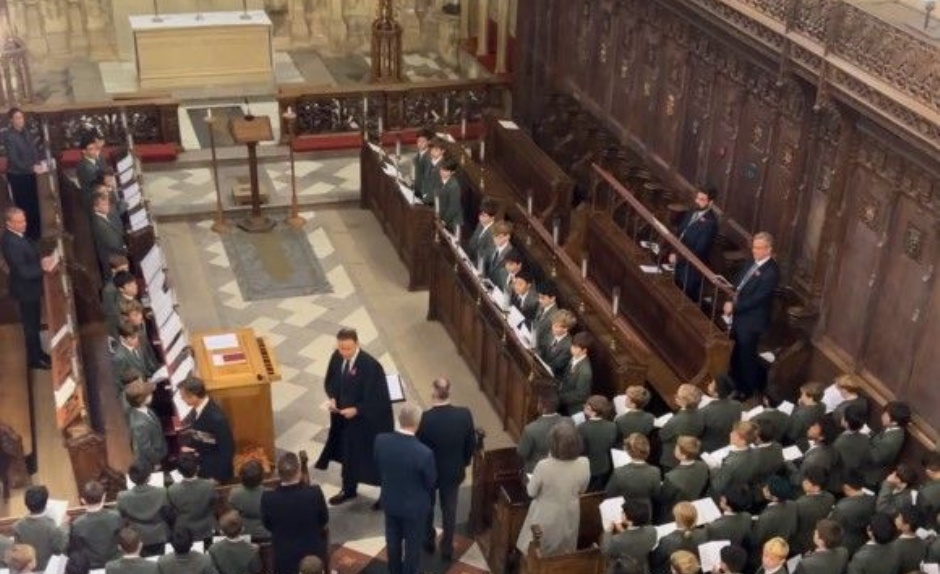Remembrance

There has been a crisper bite in the air these last 48 hours, and those of us around Winchester have just witnessed the city Christmas lights come on yesterday evening (and very well done to the Chamber Choir, who put on a fantastic performance at the event!)… but before our minds turn too decidedly towards the festive season, it’s worth us reflecting on two consecutive events in the last week that are always highlights in the Pilgrims’ calendar; or in the case of one, high lights in the Pilgrims’ calendar.
The fireworks evening last Friday and the Remembrance service and ceremony on Saturday were very different, and very special events. We’re incredibly grateful for the hard work and support of the PPA in organising the fireworks and preceding fête, both of which (sorry) went with a bang. Not a damp squib in sight. It was very much an evening of sharing a little joy together as a community.
Remembrance is of course an important and obvious time for us to focus upon respect, another of our values. The boys listened very well during the pre-service gathering to discuss the full context of Remembrance, and I felt did themselves enormous credit in their manner throughout the service and wreath laying. This was very much helped by an excellently written talk from Colonel Neil Wright MBE, delivered during the service. With Neil’s permission, I take great pleasure in including it below.
Remembrance Address – Colonel Neil Wright MBE
When I was a boy, of about the same age as some of you, I had a collection of Commando comics. As most boys, I would wait excitedly for the new edition every Saturday. I would read it from cover to cover. I would sometimes trade back copies with other boys in the playground. Perhaps some of your teachers and dads did the same when they were young!
These, of course, were comic book stories that made war seem exhilarating and exciting, a bit like a great game of rugby or football; a glamorised, unrealistic vision of war, just like in some gaming scenarios these days.
The greatest mistake of some historical accounts is to paint war as a glorious thing. Yet there is nothing glorious about war. It is a brutal, ugly, evil and terrifying thing and there is no glory in it, not even for the winners.
As The Duke of Wellington, Arthur Wellesley, said after his victory at Waterloo in 1815, “The only thing worse than a battle lost is a battle won.”
Wellesley was a seasoned military commander who had served in more than sixty campaigns, the pinnacle of which was defeating Napoleon at Waterloo, so he knew the truth. He knew what warfare could do to people, to communities, to society. He knew about the worst excesses of war, the horror, the devastation and the pitiful waste of life.
We see something of this every day on our television screens and in our news. Think of the truly awful scenes of horror and human suffering occurring every day in the Middle East and Ukraine.
And yet, amidst the savagery and brutality of warfare, some of the greatest, most honourable and noble human virtues can flourish. And this is what we are really commemorating through the Act of Remembrance.
You know, when people outside the Army would ask me to describe the soldiers I was commanding, I would often begin by saying that they were just ordinary guys and girls – like you and me – doing an extraordinary job. Yet there is nothing ordinary about marching towards danger and gunfire when everyone else is running away. And it is in these places that I have seen the greatest acts of courage and human kindness. These are the noble things, the acts of valour and honour that come to my mind when we, as a nation, stop on this day to honour our dead (as well as our injured Veterans) through the Act of Remembrance.
At the start of my career, I attended Officer Training at the Royal Military Academy, Sandhurst. Some of you may go there as young men. The motto of Sandhurst is a very good one. It is, “Serve to Lead”. Good mottos always have deeper meaning than simply words. That said, as you all know, to appreciate this you must stop, think and reflect to understand the true meaning of such words. Being a military leader is not about personal gain or glory on operations or the battlefield. It is about selfless commitment and serving the very soldiers we command. ‘Selfless commitment’ is one of the values of the British Army and, just like The Pilgrims’ School, the British Army is driven by its values and its ethos.
The Armed Services have to be strong values-driven organisations. This is because the Nation is asking soldiers, sailors and airmen to do extraordinary things; to show valour and courage, but also kindness, in the face of the worst form of human suffering. The Army’s values – my values – are Selfless Commitment, Respect for Others, Loyalty, Integrity, Discipline and Courage. These are what have shaped my character and guided me in my military career.
Your school values of Heart, Excellence, Integrity, Joy and Respect are what are shaping your character in an equally positive way. These will guide you as boys becoming men, as citizens, as followers, as leaders and servants, so long as you take time to reflect on how they matter to you. Your Headmaster, Mr Butcher, has spoken and written in recent weeks about Richard the Lionheart, so let me tell you about a lionhearted young man… He was a scholar here at Winchester College, who died serving his country in the First World War and is remembered on the Memorial Wall of the War Cloister here in the College. He was 2nd Lieutenant Alexander Gillespie, who served in my regiment, The Argyll and Sutherland Highlanders, and he is remembered as the best type of hero: for his courage and for his thoughtfulness, kindness and humility.
He was also a great writer. Shortly before he died in 1915, he wrote about his vision of what might be done with the Western Front after the war. This was published in The Wykehamist, as well as in national newspapers.
He wrote: “These fields are sacred … and I wish that when the peace comes, our government might combine with the French government to make one long avenue between the lines …. The ground is so pitted and scarred, and torn with shells, and tangled with wire, that it will take years to bring it back to use again; but I would make a fine broad road in the No Man’s Land between the lines, with paths for pilgrims on foot, and plant trees for shade, and fruit trees, so that the soil should not be altogether waste. Some of the shattered farms and houses might be left as evidence, and the regiments might put up their records beside the trenches which they held all through the winter. Then I would like to send every man, woman and child in Western Europe on pilgrimage along that route, so that they might think and learn what war means from the silent witnesses on either side. A sentimental idea, perhaps, but we might make it the most beautiful road in all the world.”
This gave Gillespie’s old Headmaster the idea of creating a War Memorial, the War Cloister that we shall visit after this service. It has also inspired the creation of the Western Front Way, a long-distance walking and cycling route from Switzerland, through France and Belgium, to the Channel Coast and evidence indeed that the pen can be mightier than the sword!
Shortly, we shall make our way to the War Cloister to lay a wreath. We shall honour the Winchester College boys - Wykehamists – who died as young men, serving their country in both World Wars. There are 500 names of Wykehamists killed in the First World War alone. Think about that number – more than twice as many as all the boys at The Pilgrims’ School. We shall also honour all our war dead and injured, in both World Wars and more recently, including the campaigns in which I served.
So, what should we think as we observe this Act of Remembrance? I think about the people like 2nd Lieutenant Gillespie, the young men and women who died in combat, who made the ultimate sacrifice for our freedom. I think about the Ramp Ceremony I all-too-frequently attended in Afghanistan, where more coffins of our young men and women were loaded onto the back of an aircraft to make their final journey home. I think of my regiment and my friends who are no longer here. And I think of those ordinary guys and girls who made an extraordinary sacrifice.
As I return to my seat now, you will have a moment to reflect upon what the Act of Remembrance means to you. Thank you.
Headmaster's Notices:
Parents will perhaps have noticed two developments of late; one at either end of the school… Firstly, I’m delighted to see the fruits of a very generous combined donation from the PPA and the last two years of Year 8 Leavers’ parents going up in our riverside garden. Though I am most precious about retaining the beauty of this area, the case for the benefits of a high-quality outdoor classroom was a very strong one:
-
to enhance our Pre-Prep Forest School provision significantly, particularly in winter weather
-
to offer a learning space for older boys in the calmest corner of the school
-
and to provide a focus for drinks events and possibly even some intimate performances held in this area
We will be striving to ‘bed it in’ to the surroundings as much as possible, and to enhance the walkway along the approach to the Pre-Prep entrance to finish off the project.
Secondly, we hope the Christmas lights at the front of school are bringing some joy and fun! Aside from looking rather wonderful, these are part of trying to maximise awareness of the school among the tens of thousands of visitors to the cathedral’s Christmas Market, which begins in a week’s time.
Tim Butcher
Headmaster








